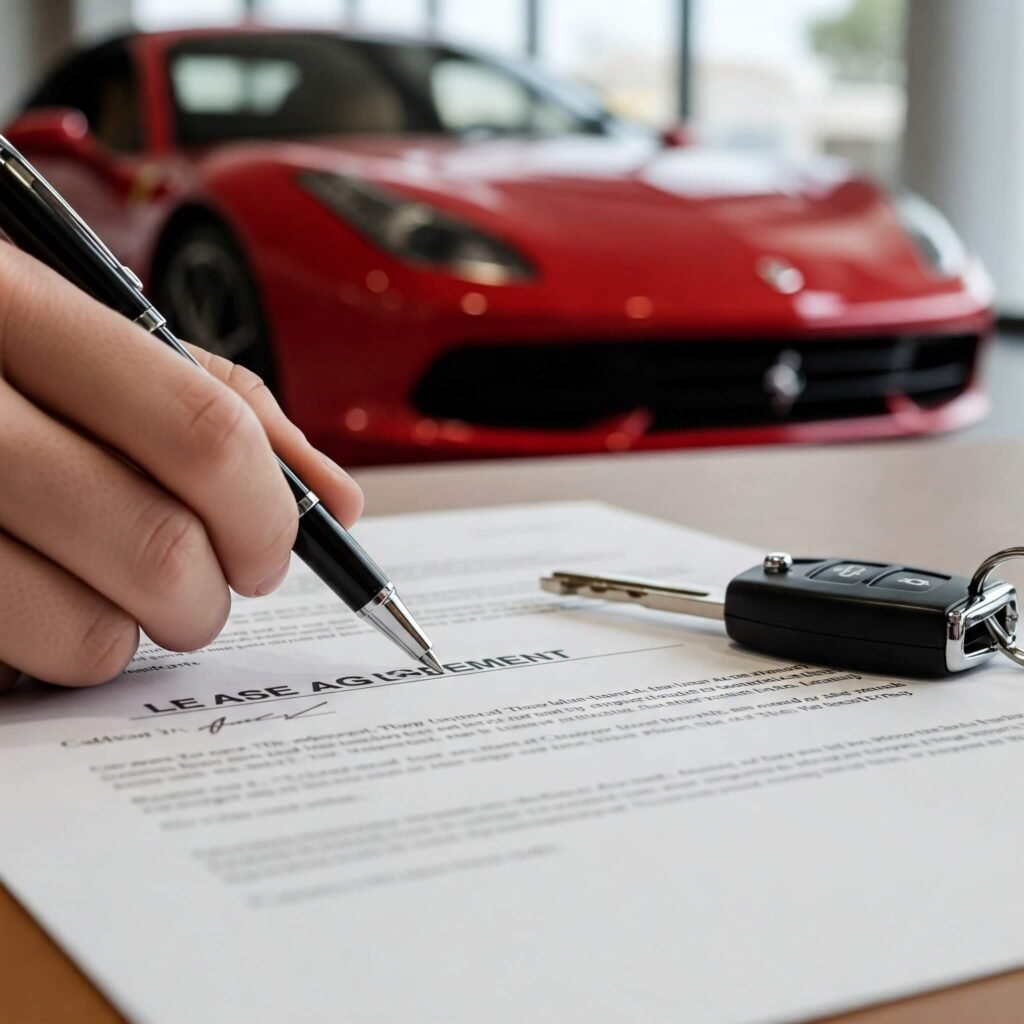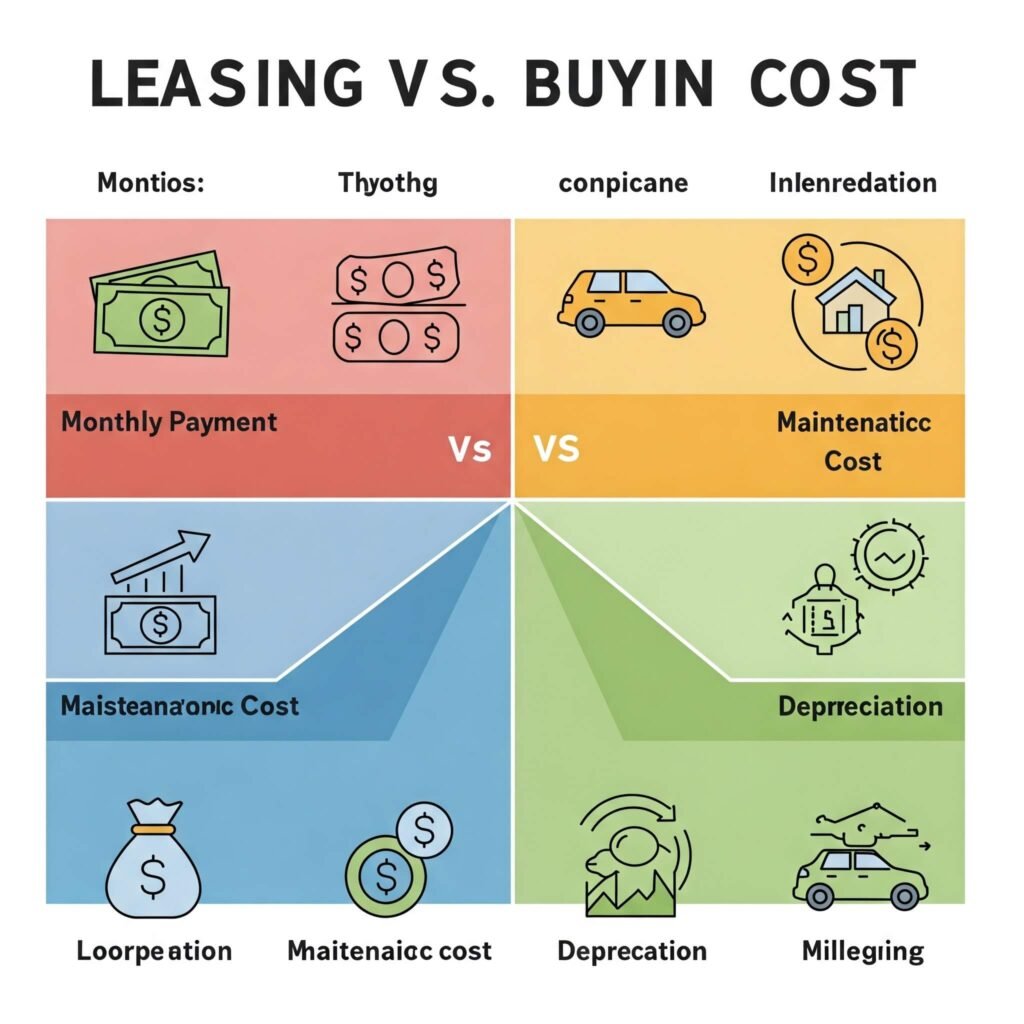When deciding between long-term car leasing or buying a vehicle, the choice can feel overwhelming. Both options have unique benefits and drawbacks, and the right decision depends on your lifestyle, budget, and priorities. This guide breaks down the pros, cons, and key considerations of long-term car leasing versus buying to help you make an informed choice.
What Is Long-Term Car Leasing?
Long-term car leasing involves renting a vehicle for an extended period, typically 2–5 years, with fixed monthly payments. Unlike short-term rentals, leasing allows you to drive a new car without committing to ownership. At the end of the lease, you return the vehicle or opt to buy it.
Key Features of Long-Term Car Leasing:
- Lower upfront costs compared to buying.
- Fixed monthly payments that often include maintenance.
- Flexibility to upgrade to a new car at the end of the lease.

The Benefits of Long-Term Car Leasing
Leasing a car offers several advantages, especially for those who value flexibility and lower initial costs. Here’s why long-term car might be the better option:
- Lower Monthly Payments: Leasing typically involves lower monthly payments than car loans, as you’re only paying for the car’s depreciation during the lease term. For example, leasing a $30,000 car might cost $300/month, while financing the same car could be $500/month.
- No Maintenance Hassles: Many lease agreements include maintenance packages, saving you from unexpected repair costs.
- Drive a New Car Regularly: Leasing allows you to upgrade to a newer model every few years, keeping you behind the wheel of the latest technology.
- Tax Benefits for Businesses: If you lease a car for business purposes, you may be eligible for tax deductions (IRS guidelines).
Real-World Example: Sarah, a 30-year-old graphic designer, leases a hybrid SUV for $350/month. She loves driving a new car every three years without worrying about maintenance or resale value.
The Downsides of Long-Term Car Leasing
While long-term car leasing has its perks, it’s not perfect for everyone. Consider these potential drawbacks:
- No Ownership: At the end of the lease, you don’t own the car unless you pay a buyout fee, which can be substantial.
- Mileage Restrictions: Most leases come with annual mileage limits (e.g., 12,000 miles/year). Exceeding this can result in costly penalties.
- Long-Term Costs: Over time, continuous leasing may cost more than owning a car outright, especially if you drive for many years.
Outbound Link: For a deeper dive into lease terms, check out Edmunds’ guide to car leasing.
The Advantages of Buying a Car
Buying a car, whether with cash or financing, means you own the vehicle outright once payments are complete. Here’s why purchasing might suit you better:
- Long-Term Savings: Once you pay off the car, you eliminate monthly payments, unlike leasing, which requires ongoing costs.
- Freedom to Customize: As the owner, you can modify the car (e.g., add custom rims or a new sound system) without restrictions.
- No Mileage Limits: Drive as much as you want without worrying about penalties.
- Resale Value: You can sell the car later to recoup some of your investment.
Data Insight: According to Kelley Blue Book, a car purchased for $30,000 may retain 50% of its value after five years, offering potential resale benefits.

The Drawbacks of Buying a Car
Buying a car isn’t always the best choice. Here are some challenges to consider:
- Higher Upfront Costs: Purchasing requires a larger down payment or higher monthly loan payments compared to leasing.
- Depreciation: Cars lose value over time, and you bear the full cost of depreciation as the owner.
- Maintenance Costs: Unlike many leases, you’re responsible for all repairs and maintenance after the warranty expires.
Real-World Example: John, a 40-year-old teacher, bought a sedan for $25,000. After five years, he spent $3,000 on repairs, but he loves owning his car debt-free.
Long-Term Car Leasing vs. Buying: A Side-by-Side Comparison
To make the decision easier, here’s a quick comparison of long-term car versus buying:
| Factor | Long-Term Car Leasing | Buying a Car |
|---|---|---|
| Upfront Cost | Low (e.g., $1,000–$3,000) | High (e.g., $5,000+ or full price) |
| Monthly Payments | Lower (e.g., $300/month) | Higher (e.g., $500/month) |
| Ownership | No ownership | Full ownership |
| Maintenance | Often included | Owner’s responsibility |
| Mileage Limits | Restricted (e.g., 12,000 miles/year) | Unlimited |
| Flexibility | Upgrade every few years | Keep or sell as desired |
Who Should Choose Long-Term Car Leasing?
Long-term car is ideal for:
- Drivers who want lower monthly payments and minimal maintenance hassles.
- People who enjoy driving new cars with the latest features.
- Business owners seeking tax benefits.
- Those who drive less than 15,000 miles annually.
Who Should Buy a Car?
Buying a car makes sense for:
- Drivers who plan to keep their vehicle for 7+ years.
- People who drive long distances and need unlimited mileage.
- Those who want to customize their car or avoid ongoing payments.
- Budget-conscious individuals aiming for long-term savings.
Actionable Tips to Decide Between Leasing and Buying
- Assess Your Budget: Calculate how much you can afford upfront and monthly. Use tools like Bankrate’s car loan calculator.
- Evaluate Driving Habits: If you drive less than 12,000 miles/year, leasing might work. For high mileage, buying is better.
- Consider Your Lifestyle: Prefer new cars every few years? Leasing is your friend. Want to own long-term? Buy.
- Compare Total Costs: Factor in depreciation, maintenance, and resale value for buying, or mileage fees and buyout costs for leasing.

Conclusion: Long-Term Car Leasing or Buying—What’s Your Pick?
Choosing between long-term car leasing and buying depends on your financial goals, driving habits, and lifestyle. offers flexibility, lower payments, and the thrill of a new car, while buying provides ownership, long-term savings, and freedom from restrictions. Weigh the pros and cons, crunch the numbers, and pick the option that aligns with your needs.
What’s your take—lease or buy? Share your thoughts in the comments below!



































